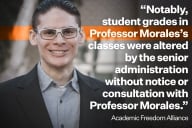You have /5 articles left.
Sign up for a free account or log in.
A new alliance of college presidents was born today, aiming both to show the world that colleges are working to measure and improve student learning and to put pressure on themselves to intensify that work.
The Presidents' Alliance is an offshoot of the New Leadership Alliance for Student Learning and Accountability, a year-old organization made up of higher education association leaders, accreditors and others who believe American colleges should voluntarily adopt evidence-based approaches to improving student learning -- both to bolster public confidence in higher education and because the institutions have a professional responsibility to prepare students for careers and life.
The Presidents' Alliance, to which 71 (most of them invited) college and university leaders had committed by today's launch, is the group's most visible initiative to date. Its goals are several, says David C. Paris, executive director of the New Leadership Alliance.
One is to get a group of college and university presidents to "stand up" individually and publicly reveal what their institutions are doing to measure student learning and to commit them to regularly reporting on their forward progress. Getting presidential buy-in is essential if colleges are to do meaningful and expansive work in this realm, Paris says.
Another is to help combat the "bad rap," as Paris calls it, that "colleges are just dragging their heels on this.... If you look at the institutions, that isn't true," says Paris. But "this is a way of saying, 'We're on it. We know we have to gather evidence, report on it, use it. And we need to do it sooner rather than later.' "
The alliance's centerpiece is a database in which participating institutions -- a mix of two-year and four-year, public and private (and one for-profit, Capella University) -- show their progress to date on a series of "commitments" related to collecting, publicizing and using information about student learning outcomes, and describe the efforts they have undertaken so far.
There is great variation in the degree of progress -- institutions like West Virginia's University of Charleston, which has built its curriculum around student outcomes, report having many initiatives in the works, while institutions such as Haverford College acknowledge having little under way so far but much planned for the next two years. But all of the presidents are putting themselves and their colleges on the line to be held accountable, in a clearly public way, going forward, Paris says.
The alliance's other, broader objective for the presidents' commitment effort is to begin to put meat on the bones of something higher education has been talking about doing for a long time: figuring out what the "best practices" are so that they can be shared and copied, Paris says. He hopes the alliance will be a vehicle through which presidents and their institutions can work together to refine current practices and measures and develop new and better ones.
"In my blue sky view," Paris says, "you could hope to see some kind of convergence, where you see that some kind of reporting regime is being used at X University, and other places agree that it is the best way -- or at least a very good way -- of doing it."
Paris says he understands that those who have been following the higher education accountability and assessment discussion unfold for the last 5 to 10 years might be skeptical about the extent to which colleges can move past the "100 flowers blooming" approach of recent years, in which institutions (or at least those that take assessment seriously) take many different approaches to measuring student learning, and broad-scale progress is hard to find.
At last month's 2010 Assessment Institute at Indiana University-Purdue University at Indianapolis, for instance, even the many true believers at the meeting acknowledged that colleges were doing a lot better job collecting data on student learning than using it in a meaningful way to shape their curriculums or improve teaching.
But getting a group of presidents to commit, as the alliance does, to "connect[ing] assessment findings to specific educational improvement efforts on campus," and to show the ways in which they are doing so, can only help, Paris says. "They're going to have a way to check themselves."








